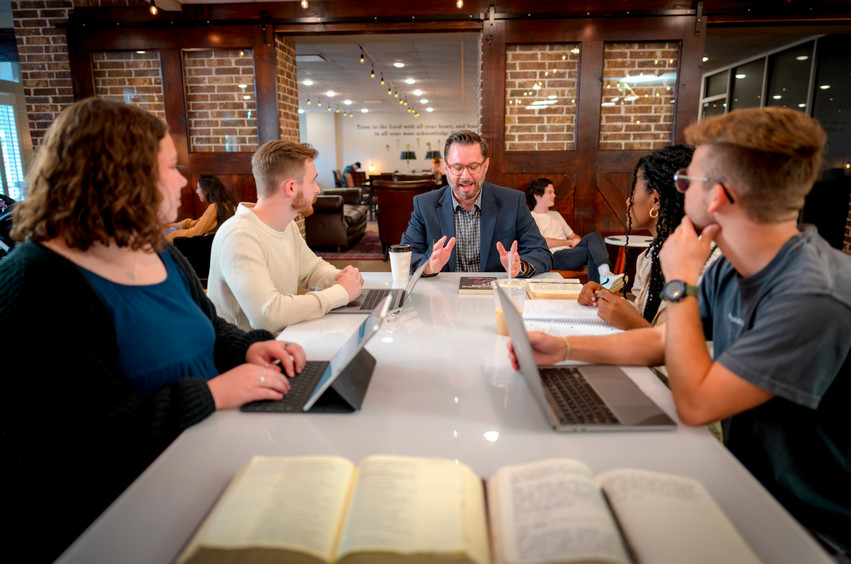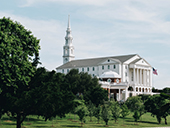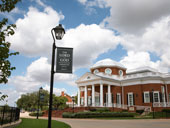Why Study History?
This article is over six months old and may reference former titles for DBU faculty or staff, discontinued programs, or other details that have since changed. If you have any questions, please contact us at news@dbu.edu, or (214) 333-5172.

Why do I love history? Why do I find it necessary within modern education?
History Increases your Understanding of God
As a Christian, the study of history enables us to see how God has worked through the ages, including how He brings great good out of terrible tragedies. We understand biblical truths best when we can understand the historical contexts surrounding them. The study of history is an invaluable piece of our education because in the Christian community, our philosophy, ethics, and theology are all enriched when we understand them through the lens of history.
History Prepares you for Success
History teaches us much about leadership. By evaluating previous leaders and the context in which they served, we see both positive and negative consequences of their decisions. Many of the best public speakers, preachers, teachers, and politicians are those who understand the historical context of their subjects and can illustrate their main points with historical stories.
History teaches us much about citizenship. The very best citizens are those who have an accurate and balanced understanding of history. The decisions political, business, educational, and vocational leaders make frequently have historical precedents. Similarly, the decisions we make in our personal lives can be better guided if we understand our family and personal history.
History also teaches us discerning thinking. I agree with James Grossman, Executive Director of the American Historical Association, who writes, “To think historically is to recognize that all problems, all situations, all institutions exist in contexts that must be understood before informed decisions can be made. No entity — corporate, government, nonprofit — can afford not to have a historian at the table.”
Lastly, history helps us understand change. We live in an ever-changing world where careers and jobs evolve with astonishing regularity. By reflecting upon history, we understand patterns within the change which gives perspective and provides examples of success and failure, cowardice and courage, wisdom and stupidity.
Many critics of history in higher education claim that a history degree is not practical. I contend that a degree in history is useful because it prepares students to think critically about the world around them. The most practical degrees to obtain in this fluctuating job market involve programs that teach students how to be lifelong learners rather than how to perform specific tasks.
Again I would agree with Grossman’s line of thought here. “History teaches students how to sift through substantial amounts of information, organize it, and make sense of it … In the process, they learn how to infer what drives and motivates human behavior from elections to social movements to board rooms … We are reminded regularly that success often goes to whoever can articulate the most compelling narrative. History majors learn to do that.”
The World Needs Christian Historians
Our history department chair, Professor Greg Kelm, wrote the following addition for our Phi Alpha Theta history honor society induction a few years ago. It states extremely well why we need historians who are Christians. Prof. Kelm wrote:
While the discipline of history is pursued through various approaches and with differing motives, the Christian historian is first of all, a seeker of truth. This quest begins and ends with the knowledge of Christ, and is furthered in this discipline by engaging in the tradition of great historical seekers of truth in the exploration of the past.
The Christian historian approaches the discipline through the lens of a biblical world view, informed with a foundational understanding of human nature, which includes the imago Dei, as well as the devastation of the Fall. Inspired by calling, and as part of a community, the Christian historian seeks to serve by employing God-given gifts of intellect and imagination to contribute to the telling of the story of human history.
The Christian historian embraces a moral obligation to pursue historical truth with integrity, to research diligently, to address context, causality, contingency and complexity, to wrestle honestly with conflicting accounts, to grapple with questions of divine sovereignty, to write with excellence, and to do all this for the glory of God, the Father, who is the source of all truth.
Fun!
Besides all this, history is just plain fun. The very best novels, movies, music, non-fiction, stories, and most interesting people are from history. Historical stories are the ultimate “reality” programming! Everyone loves a great story and a great story-teller, and some of the best stories are based in history and the very best story-tellers are often historians!
Dr. Mike Williams serves as the Professor of History for the College of Humanities and Social Sciences.








